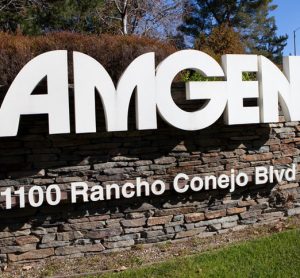Amgen presents new data from phase 3 study of Talimogene Laherparepvec in patients with metastatic melanoma
Posted: 30 September 2013 | | No comments yet
“These results further support the primary analysis reported at ASCO which demonstrated a statistically significant durable response rate…”


AMGEN (NASDAQ:AMGN) today announced additional results from a pivotal Phase 3 trial evaluating talimogene laherparepvec in patients with unresected stage IIIB, IIIC or IV melanoma compared to granulocyte-macrophage colony-stimulating factor (GM-CSF). Results of the study’s key secondary endpoints will be presented during a poster session at the 17th ECCO – 38th ESMO – 32nd ESTRO European Cancer Congress in Amsterdam (Abstract No. 3733 / P479).
New data presented include investigator assessments of response: the durable response rate (DRR) was 19 percent with talimogene laherparepvec as compared with one percent for the GM-CSF arm, and the objective response rate was 31 percent versus six percent in the GM-CSF arm. Overall there was a high degree of correlation between the independent and investigator assessments. Key secondary endpoints include time to response and duration of response by independent assessment. The median time to response was 4.1 months (range 1.2 months – 16.7 months). The duration of response was longer in the talimogene laherparepvec arm, with an estimated 68 percent of talimogene laherparepvec responders achieving responses lasting at least nine months compared to 47 percent among the GM-CSF responders.
“These results further support the primary analysis reported at ASCO which demonstrated a statistically significant durable response rate,” said Sean E. Harper, M.D., executive vice president of Research and Development at Amgen. “We look forward to the mature overall survival data expected next year.”
“This is the first successful Phase 3 study of a novel oncolytic immunotherapy,” said Howard Kaufman, M.D., professor and director of the section of surgical oncology in the Department of General Surgery, Rush University Medical Center in Chicago. “The fact that this study met the primary endpoint shows the value of continuing to explore the potential of talimogene laherparepvec in regional and distant metastatic melanoma.”
The most frequently observed adverse events were fatigue, chills and pyrexia. The most common serious adverse events include disease progression, cellulitis and pyrexia. Serious adverse events occurred in 26 percent of talimogene laherparepvec patients and 13 percent of GM-CSF patients.
Trial Design
This trial was a global, randomized, open-label, Phase 3 trial to evaluate the safety and efficacy of talimogene laherparepvec compared to a control therapy with GM-CSF in over 400 patients with unresected stage IIIB, IIIC or IV melanoma.
Patients were randomized 2:1 to receive either talimogene laherparepvec intralesionally every two weeks or GM-CSF subcutaneously for the first 14 days of each 28 day cycle. Treatment could last for up to 18 months. Where appropriate, stable or responding patients could receive additional treatment on an extension protocol.
About Melanoma
Melanoma is a type of skin cancer that is characterized by the uncontrolled growth of melanocytes, which are the cells responsible for providing pigment to the skin.1 Melanoma is the most aggressive and serious form of skin cancer in which the best treatment approach involves early detection.2 Because it is not always possible to detect cancer in its earlier stage, it can sometimes spread, or metastasize, to other parts of the body.3 The prevalence of metastatic melanoma patients facing recurrence from an earlier stage of disease is predicted to increase by 43 percent by 2015.4 Metastatic melanoma remains a devastating and difficult-to-treat disease with a high unmet need.
Currently, 132,000 melanoma cases occur globally each year.5 In the U.S., while melanoma accounts for less than five percent of skin cancer cases, it causes the most skin cancer deaths.5 The number of new cases of melanoma in the U.S. has been increasing for the last 30 years.5
About Talimogene Laherparepvec
Talimogene laherparepvec is an investigational oncolytic immunotherapy engineered to selectively replicate in tumor tissue. Talimogene laherparepvec is injected directly into tumor tissue and is designed to replicate until the membrane of the cancer cells rupture and release a possible array of tumor specific antigens and GM-CSF, a white blood cell growth factor that the virus is engineered to express. This is hypothesized to lead to the activation of a specific systemic immune response that targets tumor cells throughout the body.
References
- National Cancer Institute, National Institute of Health, Dept. of Health and Human Services; What You Need to Know About Melanoma and Other Skin Cancers; June 2010.
- American Cancer Society. Surgery for Metastatic Skin Cancer. http://www.cancer.org/cancer/skincancer-melanoma/detailedguide/melanoma-skin-cancer-treating-surgery. Accessed August 28, 2013.
- American Cancer Society. What is Metastatic Skin Cancer. http://www.cancer.org/cancer/skincancer-melanoma/overviewguide/melanoma-skin-cancer-overview-what-is-melanoma. Accessed August 28, 2013.
- Lin AY, et al. Melanoma Res. 2012; 22:454-459
- Ultraviolet radiation and the INTERSUN Programme. World Health Organization. http://www.who.int/uv/faq/skincancer/en/index1.html. Accessed May 13, 2013.




